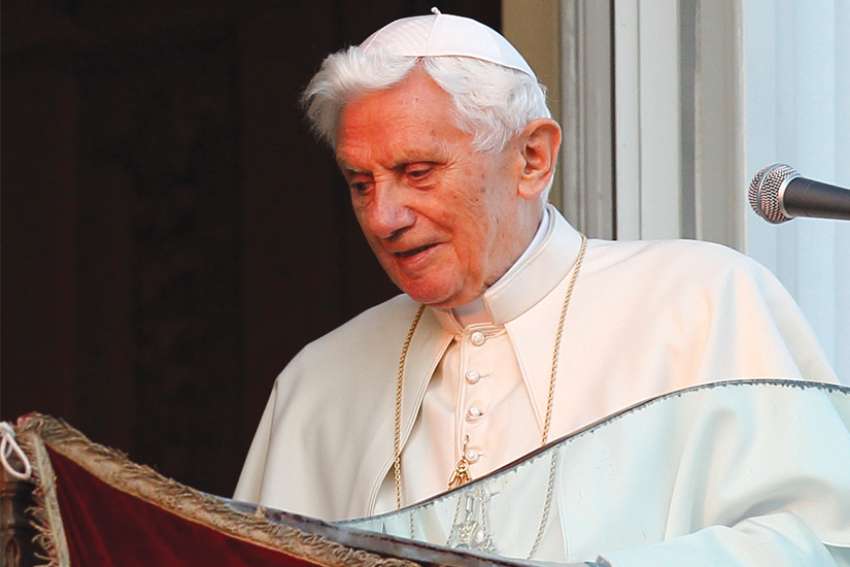The former is subject of Peter Seewald’s Benedict XVI: A Life. This massively researched, well-written biography of Joseph Ratzinger, a.k.a. Pope Benedict XVI, runs to a thousand pages and tells the reader everything one could want to know about Benedict’s life and pontificate (2005-2013). Not only has Seewald reviewed countless documents, he has spent many hours in private conversations with his subject.
Nevertheless, I must report that the book does not shed much light on the most significant question of all: Why, in 2013, did Benedict XVI defy centuries of tradition by resigning the papacy?
Joseph Ratzinger was born on Easter Saturday in 1927; his father, a policeman in the small German town of Marktl, took the baby to St. Oswald’s Church where Joseph was christened at the Easter vigil. Joseph regarded the timing as propitious: “a privilege containing a special hope and also a special commission,” he told Seewald.
The Ratzinger family was devout: morning prayers, grace before meals and regular attendance for rosary and church. Pilgrimages, confession and fasting were not excluded. Joseph Sr. gave his son Gospel commentaries and Bible studies. Before school young Joseph served as an altar boy. Looking back on his childhood, Pope Benedict said: “My vocation to the priesthood grew within me, almost naturally, without any dramatic conversion … with the help of my parents and the parish priest, I discovered the beauty of the liturgy (and of) knowing God and Scripture, through which it was possible to enter into that great adventure of dialogue with God, which was theology.”
Like many children of elderly parents (his father was 50, his mother 43) Joseph was a sickly, rather solitary, introspective boy. But as soon as he started school in 1933, his intellect shone. That was also the year that Hitler came to power. Joseph’s father despised Hitler and all he represented, but as a policeman was duty-bound to enforce Nazi law. “I was quite small,” he recalled, “but I can remember how much my father suffered.”
After grade school, Joseph attended a seminary in Traunstein, then studied at universities in Freising, Munich and Furstenried. In 1951 he was ordained a deacon and immediately hired to lecture in philosophy. On June 29, 1953 (“the most beautiful day of my life”) he was ordained a priest in Freising Cathedral.
Two years later Ratzinger received his doctorate from Munich University; his thesis was on St. Augustine’s understanding of the Church. Ratzinger conducted his defence in Latin; his examiners summed up the thesis, and his defence, in one word — “brilliant.” Ratzinger’s book, Introduction to Christianity, became an instant classic. The man who would dominate Catholic theology had arrived.
At the Second Vatican Council (1960-63) Ratzinger had been designated a peritus (a theological expert) along with a relatively unknown Polish priest (and philosophy professor), Karol Wojtyla, who would become Pope John Paul ll; it was the beginning of a friendship and collaboration that shaped their lives and respective papacies.
As confidant and right-hand man to Pope John Paul ll during his long reign (1978-2005), Ratzinger had learned the expectations and duties of the office from the inside; no man was better qualified, by intellect and experience, to assume the papacy than Ratzinger. However, his record was mixed. To some extent, the institutional corruption in the Vatican, combined with the never-ending scandal of priestly sexual abuse, frustrated his efforts to take control of a Church that sometimes seemed bent on self-destruction. Yet Ratzinger’s first love never wavered; “In the Church’s face,” he wrote, “with all its wrinkles and blemishes, it discovers the Lord’s mystery shining through.”
Pope Benedict’s mission, as he saw it, was “an inner revitalizing of the Christian faith.” In his lucid, persuasive encyclicals (Deus caritasest, 2005; Spe salvi, 2007; Caritas in veritate, 2009) he triumphed; as in his remarkable three volumes on Jesus of Nazareth, written in furtive moments snatched from a crushing schedule. But in his administration of a vast, generally hostile, Church bureaucracy, less so.
On Feb. 11, 2013, the 264th “servant of the servants of God” told cardinals assembled at the Vatican: “After having repeatedly examined my conscience before God, I have come to the certainty that my strengths, owing to an advanced age, are no longer suited to an adequate exercise of the Petrine ministry…” The shock waves reverberated through the Church and the world.
It would be fitting if after Ratzinger’s death (he is 94) he were to be declared a Doctor of the Church. It’s where he belongs.
(Hunter is Professor Emeritus in the Faculty of Law at Western University in London, Ont.)


